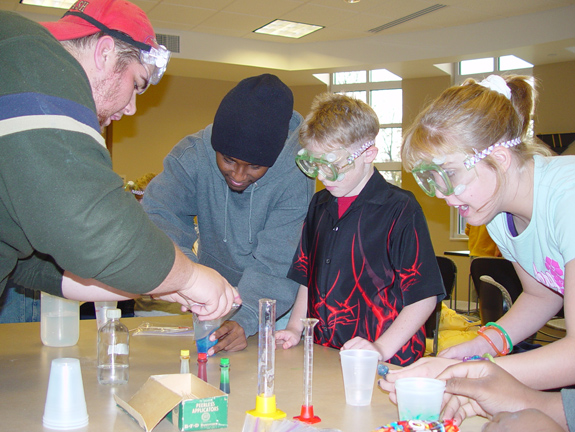 Chemistry Club members Evan Wagoner '06 and Mohamed Abdullahi '04 work with Crawfordsville schoolchildren at the College's Malcolm X Institute. |
Assistant Professor Scott Feller and members of Wabash College's Chemistry Club have taken that advice to heart, and on Monday, they took their chemistry lab "on the road" to kids in the KQ&K mentoring program at the College's Malcolm X Institute of Black Studies.
If the looks on the kids' faces and their eagerness to participate in the experiments are indicators of interest, the Club may have just inspired several future scientists.
"It is never too early to expose kids to the excitement of doing science, making observations, and drawing conclusions," Professor Feller says. "We need to produce a significantly greater number of scientists and engineers in the coming decades to meet the needs of society, and early impressions are important in determining the educational choices these kids will make."
Feller said the chemistry students were inspired to work with the grade school children by former Wabash student Chris Brown '01, who performed chemistry demonstrations for area kids two years ago.
"At the Chemistry Club meeting this fall, students Adam Moser, Tom Meeker, Damon Carl, Shaylan Owen, and I discussed demonstrations for the KQ&K students as an effective activity to highlight the American Chemical Society's National Chemistry Week," Feller says. "National Chemistry Week is actually in October but we waited until this week so that they could use the new MXI building."
KQ&K—named for three Wabash students who began the program in 1989—is the tutoring and mentoring outreach of MXI. MXI students help area school children by helping them with schoolwork and giving them learning skills, while the children enhance their tutors' Wabash education by demonstrating the essential role volunteer work plays in raising the youth of the community.
The chemistry club members also "get to see how much chemistry they know," Feller says. "I think that sometimes it is easy to become overwhelmed with how much there is to learn. In this setting the guys get to be the teachers."
Monday's session was the second such demonstration this semester. Several Wabash students visited Hose Elementary School during National Chemistry Week and worked with kids there.
"We now have a group of guys who know how to do a nice set of demonstrations, so I hope that this can become a regular community outreach activity," Feller says. "There are many teachers anxious to bring this into their classroom. The kids get to DO some science, and having a small army of Wabash students allows the school children to do experiments that would be difficult for any one teacher to supervise."